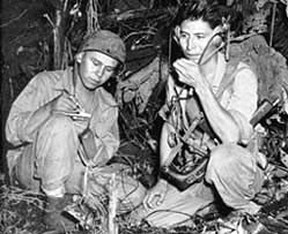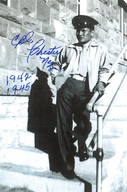Chester Nez Autographed Photograph
During World War II, the American Military realized that they needed a more secure form of battlefield communication, as the Japanese were recognized for their expertise at deciphering codes. Based on an idea from Philip Johnston, the son of a missionary who had spent his childhood with the Navajo, it was determined that the potential existed to recruit Navajo men who could use their native language to create a code.
Recruiters were sent to the Navajo reservations, with the task of finding Navajo men that were willing to volunteer for service and who were fluent in both English and Navajo. In May of 1942, the first 29 young men were inducted into the Marine Corps. After boot camp, they received training in Morse code, semaphore, military-style messages, wire laying, and learning different kinds of radios. They were then tasked with creating a code using their Navajo language. Since certain military terms were not in the Navajo vocabulary, they had to come up with code words. For example, the Navajo word for buzzard was substituted for bomber, whale was substituted for battleship, and potato was used for grenade.
After training, they were assigned to various Marine units deployed in the Pacific theater. Their performance, and the inability of the Japanese to break their code, became so valued that the Navajo Code Talker program was rapidly expanded. By the end of the war, between 375 and 420 Navajo were trained as code talkers. They took part in practically every assault the U.S. Marines conducted in the Pacific from 1942 to 1945. They served in all six Marine divisions, Marine Raider battalions and Marine parachute units. Many believe that America would not have been able to win the war in the Pacific without the Navajo Code Talkers, and it is hard to estimate the number of American lives that they saved. It is believed that their code is the only truly unbreakable code in the history of warfare.
Chester Nez was one of the original 29 Navajo Code Talkers. After training, he was assigned to a Marine unit. He landed on Guadalcanal in early November 1942, then joined the Battle of Bougainville in New Guinea in November 1943, then Guam in July 1944, then Peleliu and Angaur in September 1944. The code talkers were deemed so vital to the war effort that they did not get a leave for years. Nez’s first real break from the war came in January 1945, after he had earned enough points to be sent home.
Recruiters were sent to the Navajo reservations, with the task of finding Navajo men that were willing to volunteer for service and who were fluent in both English and Navajo. In May of 1942, the first 29 young men were inducted into the Marine Corps. After boot camp, they received training in Morse code, semaphore, military-style messages, wire laying, and learning different kinds of radios. They were then tasked with creating a code using their Navajo language. Since certain military terms were not in the Navajo vocabulary, they had to come up with code words. For example, the Navajo word for buzzard was substituted for bomber, whale was substituted for battleship, and potato was used for grenade.
After training, they were assigned to various Marine units deployed in the Pacific theater. Their performance, and the inability of the Japanese to break their code, became so valued that the Navajo Code Talker program was rapidly expanded. By the end of the war, between 375 and 420 Navajo were trained as code talkers. They took part in practically every assault the U.S. Marines conducted in the Pacific from 1942 to 1945. They served in all six Marine divisions, Marine Raider battalions and Marine parachute units. Many believe that America would not have been able to win the war in the Pacific without the Navajo Code Talkers, and it is hard to estimate the number of American lives that they saved. It is believed that their code is the only truly unbreakable code in the history of warfare.
Chester Nez was one of the original 29 Navajo Code Talkers. After training, he was assigned to a Marine unit. He landed on Guadalcanal in early November 1942, then joined the Battle of Bougainville in New Guinea in November 1943, then Guam in July 1944, then Peleliu and Angaur in September 1944. The code talkers were deemed so vital to the war effort that they did not get a leave for years. Nez’s first real break from the war came in January 1945, after he had earned enough points to be sent home.

